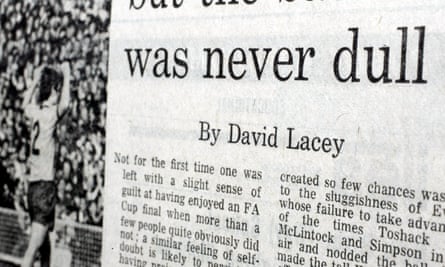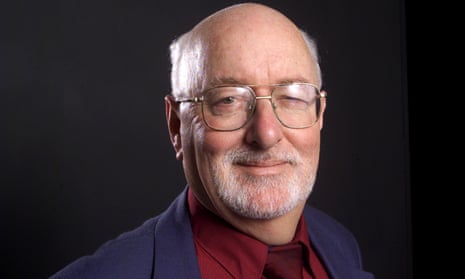It is not customary to look forward to Monday mornings but, in the heyday of the Guardian’s print sales in the late 1970s and 80s, many readers relished Monday’s paper more than anything else.
On a features page would be Posy Simmonds’ weekly dissection of middle-class life. And, further back, stretched across the width of the main sports page, David Lacey would offer his weekly dissection of football. Like Posy’s cartoon strip, this was one of the great institutions of British journalism.
Lacey, who has died aged 83, was an institution in himself. His first Guardian match reports appeared in the winter of 1964-65 and already, in a downbeat report on Portsmouth versus the old, fatalistic, Manchester City, one could detect flecks of gold in his prose.
By the time he replaced the ailing Bert Barham as chief football correspondent in 1973, he had hit the motherlode that would sustain him for 30 seasons in the job and another decade as an emeritus columnist. His writing was the antithesis of the sports pages’ other star turn, his almost exact contemporary Frank Keating. Whereas Keating was a cavalier, full of thrilling thrusts and parries while sometimes falling off his horse, Lacey was more Cromwellian; he wrote with precision, quiet elegance and sly wit.
And the Monday column was his showcase. He would attend the match of his choice on Saturday, watch Match of the Day, and next morning pull together his thoughts on the weekend and the state of the game crisply and analytically, slipping in discursive similes, metaphors and cultural references without ever troubling Pseuds Corner.
In one piece, Lacey noticed Ron Atkinson drinking gin and tonic out of a papier-mache cup (“like Beau Brummell visiting the 50-shilling tailor”); compared West Bromwich Albion’s relationship with Liverpool to a man in the Avon Gorge staring up at the Clifton Suspension Bridge; and threw in the Battle of Lepanto in 1571 for good measure. And it all worked.
The Sunday duty sports subeditors had two problems. One was to find any flaw in the copy to justify their existence. A misplaced comma? Hardly. The other was to write a headline to do the piece justice. “Lace the Ace,” he was called in the office.
Sadly, the switch of big games to Sundays in 1992 ruined the symmetry of these pieces and he was obliged to do match reports for Monday’s papers. He was ace at those too but they attracted partisans more than the neutrals who previously read Lacey for his own sake. The sport section was never quite as rich again.
Lacey was born into newspapers. He was the oldest of three sons of Les Lacey, editor of the Lewes-based Sussex Express, and Hilda (nee Roberts), a librarian and then full-time mother. His two brothers, Jeremy and Roger (who had a spell on the Guardian), also went into journalism.
Aged 16, David went straight from Lewes county grammar school to the Brighton Evening Argus, where he soon found himself reporting Brighton’s modest adventures before joining the Guardian. Aside from national service in the RAF, he never worked for anyone else, and may never have contemplated it.

In 1966 he was assigned the north-east group at the World Cup in England and thus saw Pak Doo-ik’s unforgettable goal at long-gone Ayresome Park that enabled North Korea to put paid to Italy. (“One would have thought Middlesbrough had won the FA Cup.”) Four years later he went to Mexico as Barham’s No 2. He covered 10 World Cups in all, and for the other eight he was the unassailable No 1.
Within football, the tabloids attracted more attention but he had a small but elite fanclub among the more thoughtful managers – Bobby Robson, Ron Greenwood, Dave Sexton, Bill Dodgin – who read him avidly. Before becoming Liverpool manager, Joe Fagan borrowed a copy of the Guardian to while away an idle moment: “I didn’t even know there was football writing like this,” he said.
What was also noticeable was the awe that attended Lacey from his colleagues within the press box. As well as being revered as a writer, he was also – in the days before ubiquitous replays made concentration an optional extra – the go-to man to resolve, say, a complex sequence of passes. “He had an icy brain,” said Patrick Barclay, who was his deputy for a decade. “He loved precision. He would find a new route to Villa Park or the Dell that would shave two minutes off the journey, and you had to follow it. He was a GPS system years ahead of his time.”
“After a game I would always say ‘What did you make of it, David?’,” said the Mail on Sunday columnist Pat Collins. “He’d give me six phrases and two verdicts and I’d walk away wishing I could rewrite what I’d already sent.”
He did not do news stories: managerial speculation and what the desk dismissively called “groin-strain journalism”. Someone else could chase that stuff; he would make his judgment on what he saw. But his territory was very much his, and he did not relish the company of other fancy Guardian writers at big games. “I’m coming to the Cup final with you, David,” Keating told him cheerily one day. “Very nice for you, Frank,” was the reply.
He could be far more withering than that. In 1986, the passionate and voluble Barclay told the calm and composed Lacey that he was leaving, having finally been offered the No 1 football job elsewhere. “It’s the end of an earache, Paddy,” he replied. (This is Paddy’s story, by the way.)
The only wobble in his own tenure was an offer, circa 1981, to switch to cricket, a game he relished and played socially. He decided against, though he did love to spend a couple of summer weeks covering county games, preferably in Sussex. Lewes grammar played rugby, and his active football was largely confined to refereeing. He also retained an enthusiasm for ice hockey, which he covered in Brighton. And he adored old films, which informed a good many of his gags. But chance and choice meant he applied his genius to football; he could have written as well on almost anything.
Lacey lived alone, surrounded by his football programmes. Though always enigmatic and self-contained, there was fun as well as barbed wit. During the 1978 World Cup, he was applauded by a bar-room packed with raucous Argentinians for his wine-fuelled rendition of “Sussex By the Sea”. In his last years, he moved close to Jeremy’s family in Cambridgeshire, delighting in being Uncle David. Later he moved to a care home where, his short-term memory fading, he could still reminisce about the Matthews final, Pak Doo-ik, and much more about the game he himself adorned. Belatedly, he won two sports journalist of the year awards, which is as if Liverpool had only ever been granted two League titles.
Jeremy, a financial journalist, predeceased him. He is survived by Roger, a niece and three nephews.

Comments (…)
Sign in or create your Guardian account to join the discussion